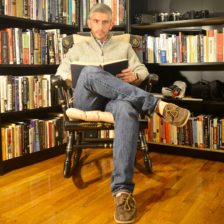Should I Reveal That My Dad Pretended to Be a Vietnam Vet?
Question:
… [M]y father sometimes talked of his military service during the Vietnam War…. he offered enough details about his service … that [everyone] … believed he was a veteran. My mother and I, however, were never sure he was telling the truth about the nature of his service…. he instructed my stepmother not to include his veteran status in his obituary…. After he died, she wanted to know more about his military service … and received back his DD Form 214 (Certificate of Release or Discharge from Active Duty) showing that he had been honorably discharged in 1968 for being medically unsuitable for duty before he even finished basic training…. she did not want to share what she had found with me, my siblings or our friends and family, lest we think less of the man whom we had all respected…. My stepmother, mother and I are the only ones in the family who know the truth. I attempted to tell my sister once, but she flatly refused to believe me…. Do I tell the rest of my family and our friends what he did, or is it all water under the bridge now that he has passed away and is unable to explain or defend himself?
Correct answer:
If someone tells a serious lie, that person usually has a positive obligation to contact anyone who heard that lie and explain the truth, and can mean initiating contact with people who might not otherwise have been in contact. Your father, however, is now dead, and that obligation died with him. You have no positive obligation to clean up the mess that he made.
You should make a reasonable effort to tell the truth to all of your direct family members, as well as close friends who would have heard the lie, as soon as opportunities present themselves. The first reason for this is to prevent a situation in which you could trick yourself into telling additional and further lies that you had no intention to tell. Whatever your father’s rationale, it’s clearly not yours; you have nothing to gain by pretending that your father was a veteran. The second reason is to give your other siblings the opportunity to stop spreading a lie that they believe to be the truth. The third reason is to prevent a future situation in which you could inadvertently benefit from someone believing that your father was a veteran.
Question:
While going through my mother’s papers prior to moving her into a nursing home (she has Alzheimer’s disease, so I cannot ask her about this), I found an eight-page love letter that she saved for 66 years. At first glance, I thought that it was from my late father…. I was shocked to discover that it was dated four years before my parents met and was from someone I had never heard of…. I read the letter in its entirety. I have no idea who the gentleman is, and there is no one I can ask. My question is simple: When faced with such a personal letter from the past, is it wrong to read it? It doesn’t change the present, and it seemed wrong just to throw it away.
Correct answer:
The letter was addressed from somebody else to your mother, and not to you – so if you were wrong to read it, then it would have been wrong regardless of who wrote it, your father or another man. So why did you include all of that extraneous information? Could it be that you feel as if you infringed on your mother’s privacy by reading a letter that some other man wrote to her in a way that would not have bothered her or you if you’d read something that your father wrote? In other words – what exactly is the ethical question here?
If your mother were healthy, you would not have read the letter at all. If she were dead, you would have no problem reading the letter, and presumably you would justify it by telling yourself that if she wanted to keep it private, she would have destroyed it. Your mother’s dementia, unfortunately, is so severe that she can not have a conversation with you. She’s still a person who deserves to be treated kindly and with whatever dignity is possible, but reading the letter did not harm her in any way. After all, you would have read it if your father had written it.
